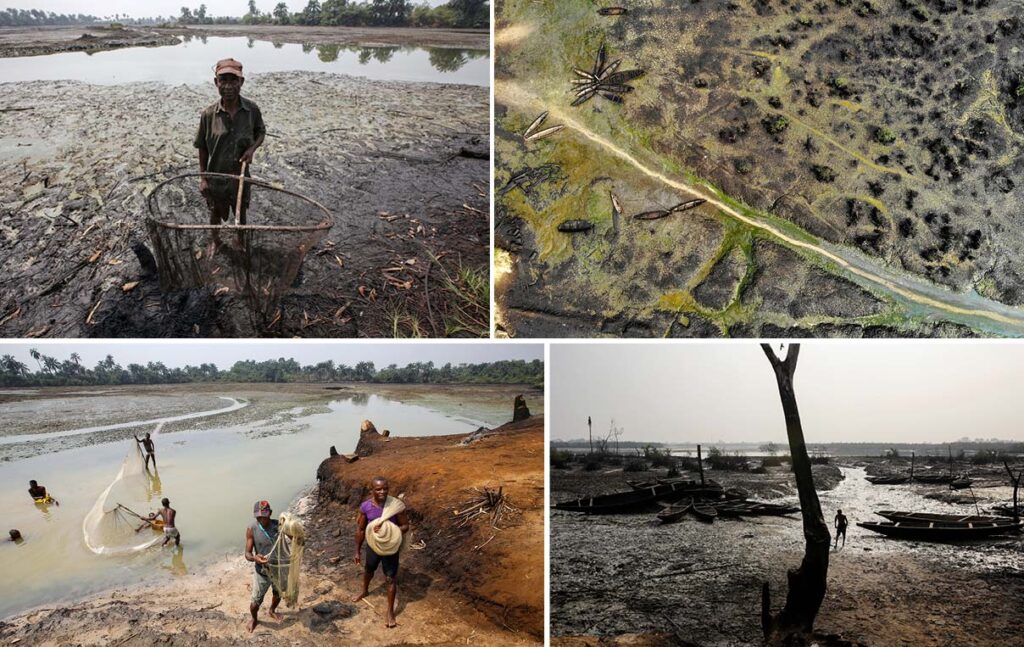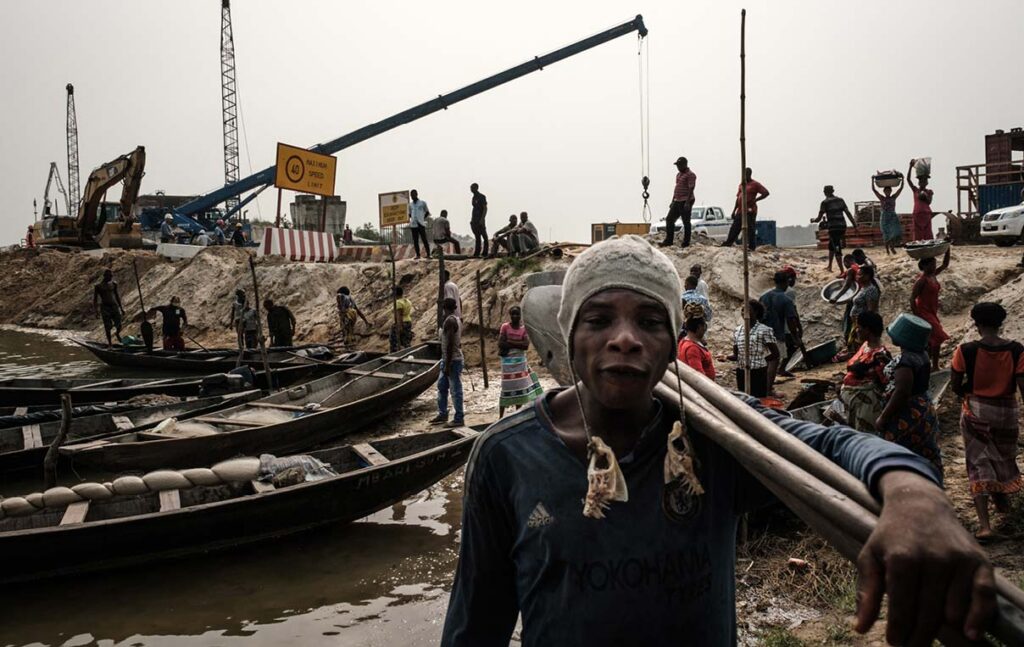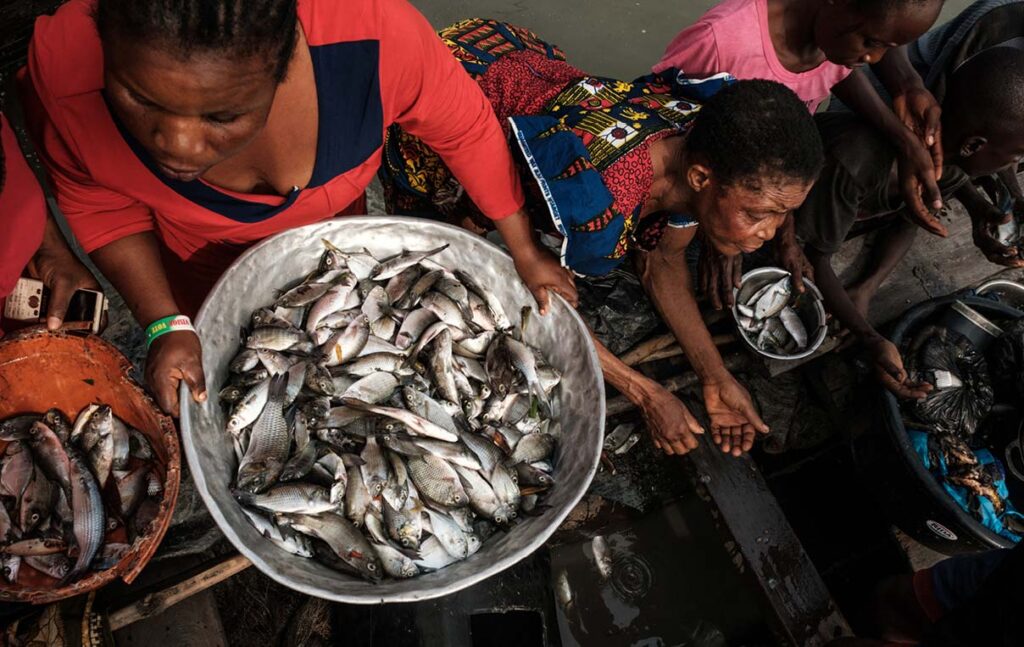Before the discovery of oil in the 1960s, Nigeria had a thriving fishing industry, providing livelihoods for millions of people. Local fishermen using canoes, nets, and lines flourished in villages along the Niger Delta and other coastal communities across the country, harvesting various species, including shrimp, fish, and crustaceans.
They exported these catches to neighbouring continents, Europe, and the Americas, contributing significantly to the national economy. However, the discovery of oil led to the neglect of the fishing industry as oil exploration attracted massive investment and the diversion of funds from other sectors.
Though nine of the 36 Nigerian states – Akwa Ibom, Bayelsa, Cross River, Delta, Edo Lagos, Ogun, Ondo, and Rivers States – share the Atlantic Ocean coastline, the country now depends on fish imports to meet demand. According to WorldFish, a leading international research organisation working to improve food security, nutrition, and livelihoods through aquatic food systems, Nigeria, which has an estimated population of 224 million people, produces around 1.2 million metric tonnes of fish annually and spends one billion dollars a year on fish imports.

As the federal government has repeatedly admitted, Nigeria imports about 2.4 million metric tonnes of frozen fish annually, which drains the country’s foreign exchange reserves.
One of the major reasons for this development is ongoing oil spills that kill fish and endanger the lives of residents in coastal communities. Spills often occur due to pipeline sabotage, and inadequate clean-up efforts have turned what was once a vibrant ecosystem into a toxic wasteland.
For instance, residents of Ayetoro, a coastal community in Ondo State, Nigeria, told Africa in Fact that livelihoods continue to suffer as a result of oil spillage, and accused oil companies of making their communities uninhabitable.
“Most of us in Ayetoro and over 200 communities on the Atlantic Ocean coastline in Ondo earn a living from fishing, which was our forefathers’ occupation,” said Aralu Emmanuel, one of the community’s youth leaders and himself a fisherman. “However, we can no longer engage in the business due to the pollution caused by oil spillage. Fish die in the river, and people have in the past lost their lives as a result.” Emmanuel added that most of the residents of his community were jobless and idle due to damaged coastal ecosystems, contributing to poverty and unemployment.
In other Niger Delta states like Bayelsa, fishermen suffer more than 200 oil spills every year, according to different news reports. Also, a recent Bayelsa State Oil and Environmental Commission report says oil companies have spilled at least 110,000 barrels of oil in Bayelsa over the past 50 years and 90% of this toxic pollution came from facilities operated by five international oil majors: Shell, Eni, Chevron, Total and ExxonMobil.
“Life has been terrible, and we have experienced a lot of hazards caused by water pollution,” said Stephen Orji, who heads a group of fishermen protesting the devastating effects of oil spillage in Bayelsa. “As I speak now, if you go to the river with your nets, you will only return with dead aquatic animals. They are all contaminated by oil spillage. Yet, there’s no compensation for the damage done to us. Representatives of the government often promise to hold various companies accountable for their negligence, but nothing significant has been done to rescue Nigeria’s fishing industry from dying.”

In a recent development, in October last year, two communities, Bille and Ogale, both in Rivers State in the Niger Delta, secured an important legal victory in a suit against Shell’s Nigerian subsidiary, Shell Petroleum Development Company (SPDC), in the United Kingdom Court of Appeal. The communities began legal action against Shell in 2015 after decades of environmental devastation caused by oil spills. More than 13,000 residents are demanding compensation for repeated oil spills allegedly from the company, which has rendered their land infertile and wiped out fish populations – their primary sources of income.
Experts argue that oil spills lead to a reduction in household food security by making seafood unsafe to eat. “It has acute and long-term effects on human health,” said Quadri Adesola, a senior researcher with Develop Africa Now, a non-governmental organisation promoting fisheries and aquaculture in Nigerian coastal communities. “Aside from poisoning the aquatic animals in the water, it also makes the water unusable for coastal communities. With all of these challenges, Nigeria’s fish industry cannot meet our consumption demands, let alone provide exports. The authorities need to give adequate attention to the fishing industry so the industry is again a profitable one.”
Oil spillage around West Africa’s coastlines is also an abuse of human rights. According to the July 2010 resolution of the United Nations General Assembly, government and international organisations are charged to provide financial resources, help capacity-building and technology transfer to help countries, particularly developing countries, to provide safe, clean, accessible and affordable drinking water and sanitation for all. The assembly added that the right to water entitles everyone to have access to sufficient, safe, acceptable, physically accessible, and affordable water for personal and domestic use.
But 14 years later, this is not the case in Nigeria’s coastal areas. In fact, many communities hosting oil exploration projects in Nigeria have been found to lack access to clean water, which further complicates the woes of the people as they are forced to ingest hydrocarbons while trying to quench their thirst.
Aside from oil company activities frustrating the livelihood of these coastal communities, residents are also faced with the challenges of rising sea levels and intense storms caused by climate change, which have been a feature of life for more than a decade but have gotten worse since 2019. The result is widespread flooding that destroys homes and properties.
According to Mercy Aiyemojuba, a fish farmer, more than 3,000 people have been displaced by sea incursions in Ayetoro, Ubale-Nla, Ilowo, Idi-Ogba, Erunna, Ipaare, Molutehin, and other communities along the Atlantic coast in the Ilaje area of Ondo state.

Aiyemojuba told Africa in Fact that she had lost her fishing boat and other equipment in a sea surge in early 2023 that had damaged her business. She then created ponds to culture fish but these had also suffered from sea surges. “The heavier the surge, the higher the loss incurred,” she said.
Experts say the government needs to support coastal communities with significant intervention and protect residents of affected communities. “Coastal communities can only survive if the government takes the necessary action, or else climate will worsen the plight of these fishermen and cause further devastation to Nigeria’s fishing industry,” said Kingsley Enoch, a fishery and aquaculture researcher at the Olusegun Agagu University of Science and Technology, Okitipupa, Ondo State (OAUSTECH).
But amid the suffering of fishermen in the Ilaje communities of Ondo State, a multi-billion naira shore protection project, which was first awarded in 2004 and awarded again in 2009 by the Niger Delta Development Commission (NDDC), has been abandoned by successive governments.
The current administration, however, has assured fishermen that the fishing industry will receive the support it needs to boost food security, job creation, and economic growth under the leadership of Minister of Marine and Blue Economy Adegboyega Oyetola.
In August last year, the minister embarked on a working and study visit to Morocco, one of Africa’s leading fishing countries, whose fishing industry plays a significant role in the country’s economy, to gain insights aimed at enhancing Nigeria’s own fisheries and aquaculture sector as well as improving port efficiency. Oyetola has emphasised the government’s commitment to exploring global best practices and fostering partnerships that will drive growth, innovation, and sustainable development for Nigeria.
Oyetola said the knowledge gained from his visit to Morocco would be instrumental in shaping Nigeria’s national policy on marine and the blue economy. He added that if properly harnessed, the nation’s fishing industry could take over from the oil sector.
In October last year, the World Bank expressed interest in collaborating with Nigeria to enhance the development of its marine and blue economy sectors, particularly in sustainable fisheries. If all of these proposals come to fruition, Nigeria can revive its dying fishing industry and ensure food security, economic growth, and sustainable development.

Adejumo Kabir
Adejumo Kabir Adeniyi is a senior researcher at Good Governance Africa-Nigeria. He is an expert with many years of experience in community development work and governance accountability sector. Before joining GGA, Adejumo worked at Premium Times and HumAngle Media, two of Nigeria’s biggest newspapers specialising on conflict and accountability reporting. His work has featured on esteemed local and international platforms, including Zam magazine, El Pais, IJNet, Premium Times, HumAngle Media and TheCable among others. He is a 2019 recipient of the Diamond Awards for Media Excellence, a 2020 recipient of the Thomson Foundation Young Journalist Award in the United Kingdom, and a 2021 recipient of NAREP Oil and Gas Fellowship.



